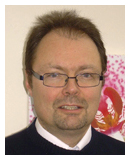England – Matthew Hoghton
 Ég nýt þess að vera heimilislæknir og fá að sinna fólki með margskonar vandamál, einkum þroskavandamál. Síðustu 25 árin hef ég orðið vitni að því hvað erfðafræði og nú síðast utangenaerfðafræði hefur mikil áhrif í starfi mínu en um það bil einn af hverjum 10 hefur vandamál sem rekja má til erfða.
Ég nýt þess að vera heimilislæknir og fá að sinna fólki með margskonar vandamál, einkum þroskavandamál. Síðustu 25 árin hef ég orðið vitni að því hvað erfðafræði og nú síðast utangenaerfðafræði hefur mikil áhrif í starfi mínu en um það bil einn af hverjum 10 hefur vandamál sem rekja má til erfða.
Heimilislæknar eru þjálfaðir í því að finna einstaklinga sem eru með erfðavandamál og taka þátt í eftirliti og umönnun þeirra. Um leið er það hlutverk okkar að vísa þeim sem þess þurfa áfram til sérfræðinga í erfðaheilbrigðisþjónustu.
Heimilislæknisfræðin er að því leyti sérstök að sjúklingarnir eru læknisins frá vöggu til grafar en undanfarið hefur það hugtak víkkað og nær nú frá því fyrir getnað – því oft koma vandamálin upp fyrir getnað og ná út yfir gröf og dauða.
I love being a GP as I have the opportunity to be involved a range of conditions particularly with people with learning disabilities after they were deinstitutionalized back into the community in 1990s in the UK.
Over the past 25 years I am noticing the impact of genetics and epigenetics and the role they play in the day to day care of my patients and their families.
The UK RCGP curriculum statement now estimates that at least one in ten of the patients seen in primary care has a disorder with a genetic component.
As Gps we can use our skills to help identify patients with, or at risk of, a genetic condition, clinically help manage genetic conditions and communicate genetic information in an understandable manner.
We often have to help patients to manage risks particularly when the guidelines fall short
At the same time one of our key roles remains identifying patients and families who would benefit from being referred to appropriate specialist genetic services and to potential research studies
I used to think of primary care covered everything “Cradle to Grave” but now I realise I need to think the wider remit of “Sperm to Worm” to include the incredible broadband range of services our patients, their families and carers need now and into the future.
